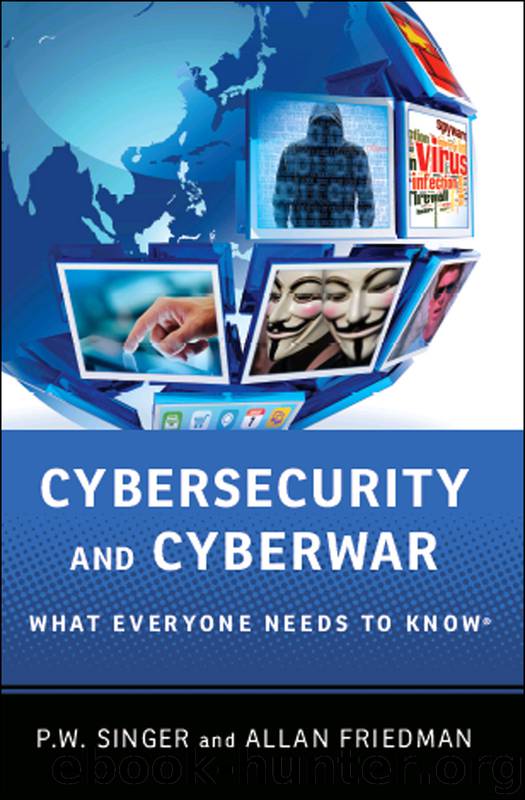Cybersecurity and Cyberwar by Friedman Allan Singer Peter W. & Allan Friedman

Author:Friedman, Allan, Singer, Peter W. & Allan Friedman
Language: eng
Format: epub, mobi, azw3
Publisher: Oxford University Press, USA
Published: 2014-08-31T04:00:00+00:00
Are There Lessons from Past Arms Races?
“We are here to make a choice between the quick and the dead.… If we fail, then we have damned every man to be the slave of fear. Let us not deceive ourselves; we must elect world peace or world destruction.”
In June 1946, Bernard Baruch, the personal representative of President Truman, made this speech to the United Nations as part of an amazing offer that history little remembers. Despite the fact that the United States was the only nation with nuclear weapons at the time, it offered to turn over all its nuclear bombs to the United Nations. Baruch’s condition was that all other nations also agree not to build them and open themselves up to inspection. It seemed a noble gesture, but the Soviets (who wouldn’t be able to figure out how to build nuclear bombs for another three years) balked. They demanded that the United States instead first give up its weapons and only afterward should the world develop a system of controls. They were also deeply suspicious of the UN, feeling that it was too US-dominated to be trusted (how things have changed!). With the two superpowers at loggerheads, the Baruch plan fell apart. Instead, a nuclear arms race would shape the next 50 years of global politics, a time in which over one hundred thousand atomic bombs would be built and the world would almost be destroyed several times over, as during close calls like the Cuban Missile Crisis.
While today’s emerging cyber arms races are far from identical to the Cold War, there are still lessons that can be learned from it. Or, to paraphrase Mark Twain, while history may not always repeat itself, “It does rhyme.”
One of the most instructive lessons is that the initial periods of a burgeoning arms race are often the most dangerous. These early days have a dark combination. The possessors of the new technology see themselves as having a unique advantage but one that is fleeting, creating a “use it or lose it” mentality. It is also the period in which the technology and its consequences are least understood, especially by senior leaders. In the Cold War, for example, probably the scariest time was not the Cuban Missile Crisis, but the late 1940s and 1950s when the real-world versions of Dr. Strangelove were taken seriously, arguing that nuclear war was something that was not only survivable but winnable. This was a period that saw everything from General Douglas Macarthur’s 1951 demand to be given sole discretion to drop atomic bombs on mainland China to perhaps one of the most outrageous nuclear concepts of all, Project A-119. When the Soviets launched the Sputnik satellite into space in 1957, the US Air Force proposed a nuclear missile be shot at the moon, just to demonstrate that the United States could also do exciting things in space.
In the cyber world, there is justifiable concern that at least some elements of this combination are also present today. The
Download
Cybersecurity and Cyberwar by Friedman Allan Singer Peter W. & Allan Friedman.mobi
Cybersecurity and Cyberwar by Friedman Allan Singer Peter W. & Allan Friedman.azw3
This site does not store any files on its server. We only index and link to content provided by other sites. Please contact the content providers to delete copyright contents if any and email us, we'll remove relevant links or contents immediately.
The Mikado Method by Ola Ellnestam Daniel Brolund(23572)
Hello! Python by Anthony Briggs(22707)
Secrets of the JavaScript Ninja by John Resig Bear Bibeault(21526)
Kotlin in Action by Dmitry Jemerov(20570)
Dependency Injection in .NET by Mark Seemann(20491)
The Well-Grounded Java Developer by Benjamin J. Evans Martijn Verburg(20388)
OCA Java SE 8 Programmer I Certification Guide by Mala Gupta(19538)
Algorithms of the Intelligent Web by Haralambos Marmanis;Dmitry Babenko(18334)
Grails in Action by Glen Smith Peter Ledbrook(17458)
Adobe Camera Raw For Digital Photographers Only by Rob Sheppard(16976)
Sass and Compass in Action by Wynn Netherland Nathan Weizenbaum Chris Eppstein Brandon Mathis(14871)
Secrets of the JavaScript Ninja by John Resig & Bear Bibeault(12834)
Test-Driven iOS Development with Swift 4 by Dominik Hauser(11242)
A Developer's Guide to Building Resilient Cloud Applications with Azure by Hamida Rebai Trabelsi(10603)
Jquery UI in Action : Master the concepts Of Jquery UI: A Step By Step Approach by ANMOL GOYAL(10487)
Hit Refresh by Satya Nadella(9138)
The Kubernetes Operator Framework Book by Michael Dame(8544)
Exploring Deepfakes by Bryan Lyon and Matt Tora(8372)
Robo-Advisor with Python by Aki Ranin(8318)
